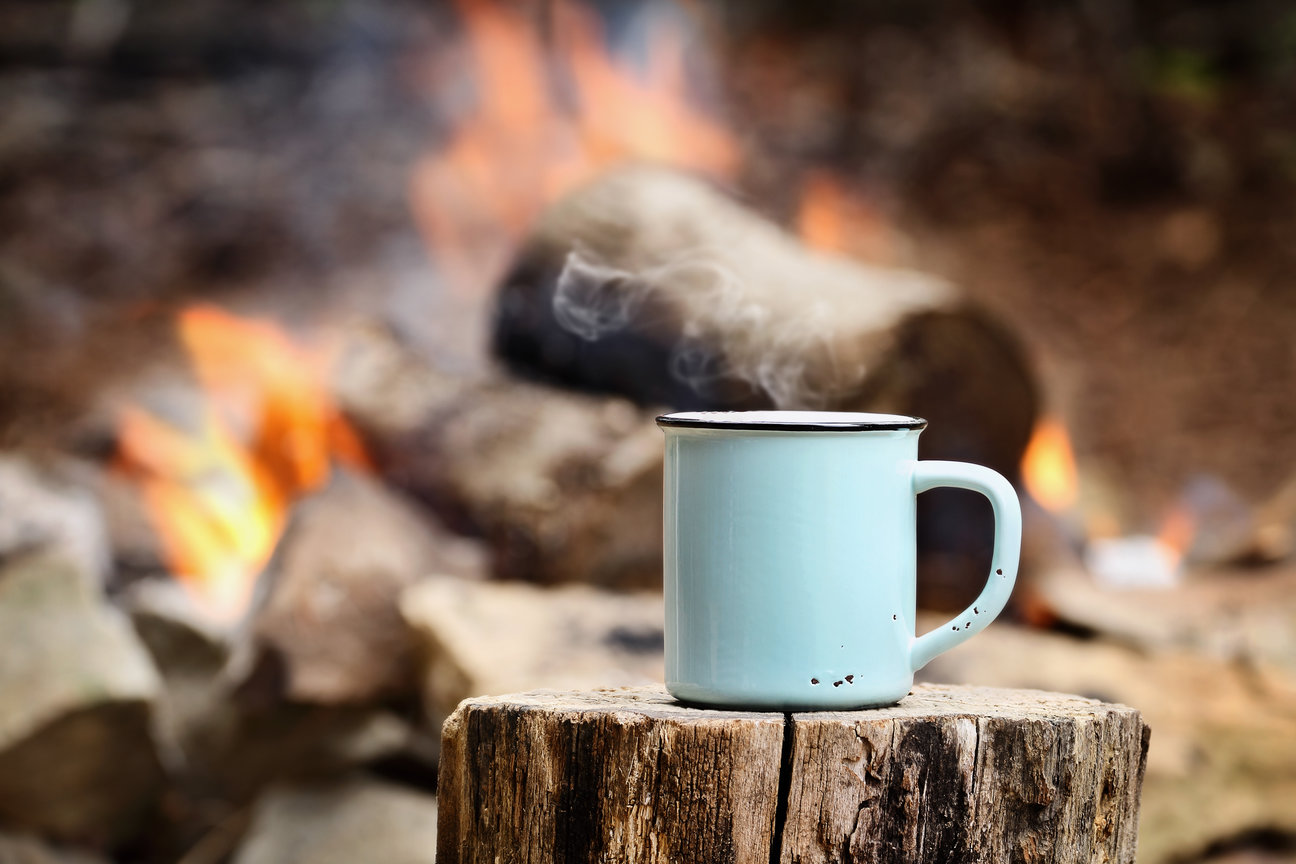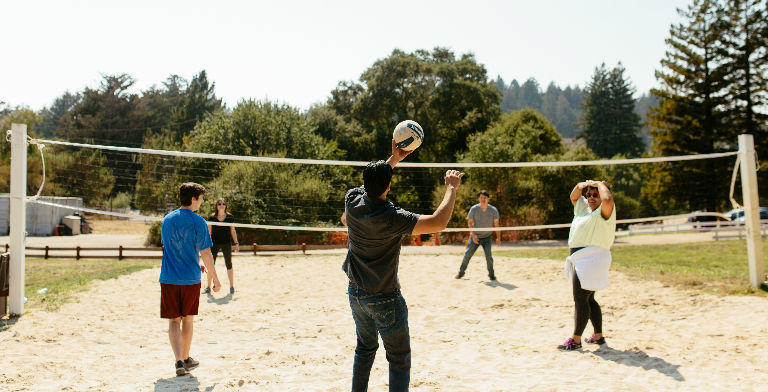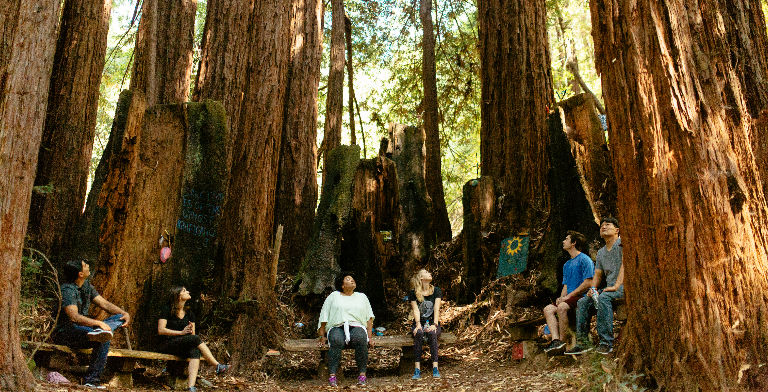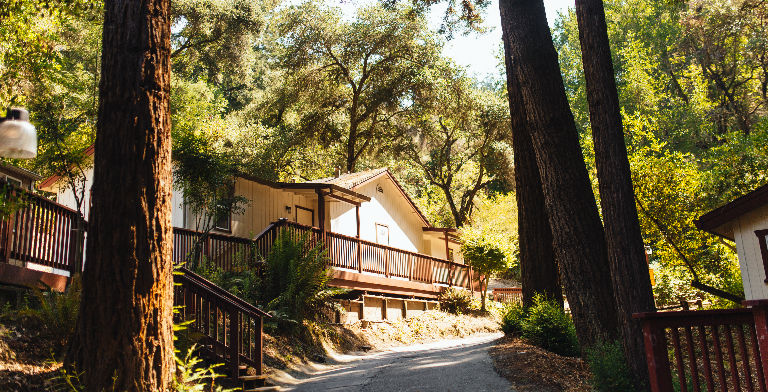The Camp Recovery Center helps adults struggling with marijuana abuse find long-term recovery. Located near Scotts Valley & San Jose, CA, The Camp provides premier marijuana abuse rehabilitation.
Marijuana Abuse Rehab
Marijuana Abuse Rehab Near Santa Cruz & San Jose
Prolonged abuse of marijuana can have a profoundly negative effect on a person’s life. Regardless of whether an individual smokes, brews, or prepares food with this substance, marijuana abuse carries the potential to adversely impact his or her ability to function in a healthy manner. The relaxed feelings and sense of detachment from one’s surroundings that occur when a person abuses marijuana can impair one’s ability to perform well in school or at work, which can lead to academic failure and loss of employment. Additionally, if a person who abuses marijuana is also suffering from an untreated mental health condition, the symptoms of that illness could become worse and lead to additional strife in that person’s life. A key thing to know, however, is that a person who is struggling with the symptoms of a marijuana abuse problem can seek treatment at a rehab center and end this destructive form of addiction.
At The Camp Recovery Center, we recognize how difficult it can be to overcome a marijuana abuse problem, and we have created rehab programming that is aimed at helping individuals learn the skills necessary for defeating their addiction to this dangerous substance and stepping forward into a transformed life with a renewed sense of confidence in their ability to be happy, healthy, and successful.
Helping a Loved One
Helping a Loved One or Family Member Enter Marijuana Abuse Rehab
Individuals who are close to someone who has become addicted to marijuana often find themselves unsure of what they can do to help someone end their abuse of this substance. As with other types of substance abuse, friends and family members often feel powerless against their loved one’s compulsion to use marijuana, as advisements to simply stop using this drug frequently seem to go unheard. However, you, as a concerned friend or family member, can play an important role in helping your loved one get the rehab that he or she needs to overcome his or her marijuana abuse problem. Consider doing the following:
- First, if you are unsure if your loved one’s abuse of marijuana is severe, it can be advantageous to educate yourself on the signs and symptoms of marijuana addiction. It is also beneficial to learn about the effects of marijuana abuse, as this can also offer you insight on the severity of your loved one’s substance abuse problem as well.
- Have a conversation with your loved one about his or her marijuana use. Convey your concerns, share information that you have learned, and be open to hearing what your loved one has to say in response. Your loved one may deny his or her addiction to marijuana, however it is important to avoid being judgmental or respond in a defensive manner during this conversation.
- Look into rehab options that care for those grappling with a marijuana abuse problem. Furthermore, if your loved one is battling a mental health condition at the same time, it will be beneficial to consider rehab centers that treat substance abuse and mental health concerns.
- Contact treatment providers to inquire about their treatment options, treatment methods, and admissions process and then share this information with your loved one.
- Discuss the need for rehab with your loved one and convey the ways in which you intend to support him or her during the treatment process.
It is important to keep in mind that overcoming a marijuana addiction or abuse problem is no easy feat. There may be setbacks or situations in which your loved one will struggle to refrain from abusing marijuana. However, by offering ongoing support and encouragement, your loved one can feel confident and remain on the path towards a recovered life.
Why Consider Us?
Why Those Near Santa Cruz & San Jose Should Consider Marijuana Abuse Treatment at The Camp Recovery Center
When a person first experiments with marijuana, he or she may not fully realize the scope of adversities that could arise should experimentation progress into regular abuse of this substance. The high that is elicited by the abuse of marijuana can cause a person to experience a decline in motivation when it comes to completing even the most mundane of tasks. Should substance abuse of this kind persist, this lack of motivation could carry over and begin to negatively impact one’s performance at school or work. With specific regards to an individual physical health, prolonged abuse of marijuana could damage a person’s lungs and hinder the healthy functioning of other vital organs. In terms of an individual’s mental health, short term memory and cognitive efficacy can be affected, as marijuana is known to impact braining functioning in a negative manner. If a person is suffering from a mental health condition, marijuana abuse can exacerbate symptoms and cause a decline in the emotional well-being of the user. Luckily, there are rehab options for treatment that can help people, young and old, in their pursuits of marijuana-free lives.
Types of Treatment
Types of Marijuana Abuse Treatment Offered at The Camp Recovery Center
Since opening our doors in 1984, The Camp Recovery Center has helped thousands of individuals break free from the grips of their addiction to marijuana. Remaining steadfast in our dedication to provide the highest quality marijuana addiction treatment to those who are entrusted into our care, we embrace the values of integrity, responsibility, respect, accountability, and excellence in the rehab we provide for marijuana abuse.
The Camp is staffed by an experienced and expert group of drug rehabilitation professionals, nurses, addiction counselors, and family therapists. Surrounded by the serenity of the majestic redwoods of the Santa Cruz Mountains, The Camp is proud to provide rehab in a tranquil environment that offers walking trails, basketball courts, tennis courts, volleyball courts, and a large sun-lit swimming pool. The beautiful surroundings of our treatment center, coupled with our nationally accredited and highly structured rehab programs, provides an eclectic, yet evidenced-based approach that offers new beginnings for adults who are struggling with a marijuana abuse problem.
The various types of therapeutic interventions that individuals may take part in while engaged in treatment at our treatment center include:
Detoxification: When residents arrive at The Camp with drugs or alcohol in their bodies, they may benefit from going through the detoxification process prior to fully engaging in programming. When deemed appropriate for a resident’s treatment plan, an offsite doctor, typically located near the Santa Cruz/San Jose, CA Areas, will develop and approve an appropriate detox protocol that will be implemented in order to best meet each resident’s specific needs.
Medication management: When residents are battling the symptoms of a co-occurring mental health condition in addition to an addiction to marijuana, they may be referred to meet with a psychiatrist to determine if psychotropic medications would be a beneficial addition to their rehab plan in order to alleviate their distressing symptoms. When this is the case, residents will continue to meet with the psychiatrist once each week in order to monitor the effects of any medications that are prescribed and to make any adjustments that are needed. Our nursing staff also assists in monitoring residents’ medications.
Individual therapy: Residents receiving treatment for marijuana addiction meet with their case managers twice weekly for individual therapy sessions. These sessions are designed to be a time for residents to process through their experiences in rehab, while also addressing any concerns that may arise.
Group therapy: A major component to the rehab provided at The Camp lies in the use of group therapy. Residents take part in a number of different groups 7 days per week, while also engaging in process groups 5 days per week. The specific groups that residents can expect to partake in may include:
- Men’s Group
- Experiential Group
- Activity Group
- Music / Poetry Groups
- Detox Groups
- Focus Groups
- CBT Groups
- Women’s Group
Throughout their participation in these various groups, residents will benefit from taking part in discussions on topics that may include, but are not limited to, the following:
- Relapse prevention
- 12-Step Recovery
- Self-helping thinking
- SMART Recovery
Family therapy: Those receiving treatment for marijuana addiction have the option to participate in family therapy sessions led by marriage and family therapists. Residents and their family members will take part in family therapy sessions twice monthly. These sessions can benefit the family unit as a whole as lines of communication are reopened and negative feelings and emotions related to marijuana abuse are confronted, addressed, and healed.
Experiential therapy: In order to provide marijuana addiction treatment that is holistic in nature, The Camp offers various types of experiential therapies that typically take place on a weekly basis and participation in various types of games. Additionally, there is time set aside for residents to spend in the gym 6 days per week. Examples of the additional experiential therapies that residents may engage in throughout their time at our rehab center can include:
- Acupuncture
- Meditation
- Yoga
Community meetings: Another major component to the rehab process at The Camp lies in our resident-run community meetings. These community meetings occur every morning, 7 days per week, where residents go over the day’s agenda, do readings, and talk about various issues pertaining to them as a group. We have found that these community meetings are immensely beneficial to residents as they not only provide them with a sense of independence in running their own meetings, but they also help residents learn to support each other and develop sober relationships that can last once they have left treatment and returned to their communities.
At The Camp Recovery Center, we are dedicated to helping you get back on the road to wellness, freed from the compulsion to abuse marijuana. Through the use of highly individualized rehab that is complemented by the utilization of a social model of treatment, the care provided by the compassionate staff at The Camp will help residents spring forward toward the next appropriate step in their level of care.
Knowing that treatment does not end with the completion of residential rehab, The Camp is pleased to offer intensive outpatient programming (IOP) for adults who are in need of a structured continuing care option once leaving The Camp. Our intensive outpatient program is convenient to the Santa Cruz and San Jose, CA areas. Our case managers work with all residents to ensure that the discharge process from the residential level of rehab is a streamlined one and that continuing care services are appropriately lined up so that individuals can enjoy a safe and comfortable transition into life after residential treatment.
















